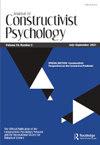解构非白人和白人客户:澳大利亚心理健康从业者与白人和非白人相关的上级构念
IF 0.7
4区 心理学
Q3 PSYCHOLOGY, CLINICAL
引用次数: 2
摘要
在澳大利亚,对多样性的接受和包容受到了主流社会政治和种族文化框架的挑战。为了检验白度对从业者建构系统的影响,本研究探讨了心理健康从业者对非白人和白人的建构和偏好,以及白度和非白度的框架。20名白人和非白人心理健康从业人员和受训人员有目的地抽样,并使用改进版的阶梯访谈技术进行访谈。数据按主题进行分析,并使用个人构念理论进行解释,这是本研究的理论框架。这些发现重申了研究文献中的发现,这些文献强调了白人对非白人以及白人和非白人的结构的持续作用。结果表明,在心理健康从业者中,关于白人和非白人结构的话语发生了潜在的转变。这种转变可能是对差异视而不见和承认不同群体所经历的不平等和不平等的运动。这种转变意味着白人和非白人都有更多的机会获得和参与旨在改善心理健康的支持。本文章由计算机程序翻译,如有差异,请以英文原文为准。
Construing Non-White and White Clients: Mental Health Practitioners’ Superordinate Constructs Related to Whiteness and Non-Whiteness in Australia
Abstract Acceptance and inclusion of diversity is challenged by the prevailing sociopolitical and ethnocultural framework of Whiteness in Australia. To examine the impact of Whiteness on practitioner construct systems, mental health practitioners’ constructions and preference for non-White and White people, as well as frameworks of Whiteness and non-Whiteness, were explored. Twenty White and non-White mental health practitioners and trainees were purposively sampled and interviewed using an adapted version of the laddering interview technique. Data was analyzed thematically and interpreted using Personal Construct Theory—the theoretical framework that informed the study. The findings reiterate those found in research literature which highlights the persistent role of Whiteness on constructs of non-Whiteness, as well as on White and non-White people. The results suggest that a potential shift has occurred in the discourse on constructions of White and non-White people amongst mental health practitioners. This shift may be the movement away from being blind to difference and acknowledgement of the inequities and inequalities experienced by diverse groups. The implications of such a shift allow both White and non-White people increased opportunities for access to and engagement with supports aimed at improving psychological wellbeing.
求助全文
通过发布文献求助,成功后即可免费获取论文全文。
去求助
来源期刊

Journal of Constructivist Psychology
PSYCHOLOGY, CLINICAL-
CiteScore
2.40
自引率
0.00%
发文量
22
期刊介绍:
Psychology and related disciplines throughout the human sciences and humanities have been revolutionized by a postmodern emphasis on the role of language, human systems, and personal knowledge in the construction of social realities. The Journal of Constructivist Psychology is the first publication to provide a professional forum for this emerging focus, embracing such diverse expressions of constructivism as personal construct theory, constructivist marriage and family therapy, structural-developmental and language-based approaches to psychology, and narrative psychology.
 求助内容:
求助内容: 应助结果提醒方式:
应助结果提醒方式:


